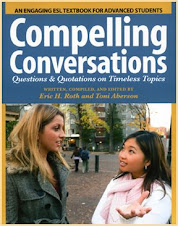Seek to Understand
Have you ever seen two emotional people talk past each other? Both talk and neither listen. Both want to tell the other, and don’t want to hear – or understand – what the other person is saying. This happens too often in stressful workplaces.
Stephen Covey, author of the international bestseller called “Seven Habits of Highly Effective People, advises people “to seek first to understand, then to be understood.” Following this traditional wisdom can improve workplace relationships and communication.
What are some techniques that can help understand other people? Here are some tips:
• Listen first and avoid interrupting.
• Pause before speaking.
• Look people in the eye.
• Be curious.
• Ask “what” and “how” questions to get more information.
• Keep the voice down. Stay calm. Talk slow.
• Repeat or rephrase what people say to avoid misunderstandings.
What are some other tips to avoid misunderstandings or conflicts at work?
1.
2.
3.
4.
What are some advantages of staying calm at work?
1.
2.
3.
Ask more. Know more. Share more.
Create Compelling Conversations.
Visit www.CompellingConversations.com
Showing posts with label conversation tip. Show all posts
Showing posts with label conversation tip. Show all posts
Saturday, August 23, 2008
Monday, August 4, 2008
Workplace Conversation tip: Tone, Volumen, and Context Matter!
Style matters – especially when we talk with our co-workers, consumers, patients, and supervisors. English language learners, recent immigrants, and far too many other people who work in English sometimes seem to forget this!
Consider the difference in how these requests sound.
Shut off the TV!
Please turn off the TV?
Could you turn off the TV?
Would you please turn off the TV?
Close the door!
Close the door; it’s noisy out there.
Shut the damn door!
Would you please close the door; it’s noisy out there.
Could you get the door?
Can you close the door?
Sometimes, especially in an emergency, it is appropriate to warn other people with a short command.
Call the police!
Help!
Shut the door!
We recognize it is an emergency because of the way the request is made. It’s an order.
I. When would it be appropriate to give a warning on your job? Please give 3 examples.
1.
2.
3.
But, usually, we also make our requests that are not emergencies. We can – and should- give suggestions in a kinder, gentler way.
We can use many words to make requests and suggestions:
May Can Could Would Should Might
II. Please write a request that you might give or hear at work with these words.
1. Can ______________________________________________?
2. May ______________________________________________?
3. Could _____________________________________________?
4. Would_____________________________________________?
5. Should_____________________________________________?
6. Might _____________________________________________?
Adding the word “please” makes your requests and suggestions sound nicer too!
Ask more. Know more. Share more.
Create Compelling Conversations.
Visit www.CompellingConversations.com
Consider the difference in how these requests sound.
Shut off the TV!
Please turn off the TV?
Could you turn off the TV?
Would you please turn off the TV?
Close the door!
Close the door; it’s noisy out there.
Shut the damn door!
Would you please close the door; it’s noisy out there.
Could you get the door?
Can you close the door?
Sometimes, especially in an emergency, it is appropriate to warn other people with a short command.
Call the police!
Help!
Shut the door!
We recognize it is an emergency because of the way the request is made. It’s an order.
I. When would it be appropriate to give a warning on your job? Please give 3 examples.
1.
2.
3.
But, usually, we also make our requests that are not emergencies. We can – and should- give suggestions in a kinder, gentler way.
We can use many words to make requests and suggestions:
May Can Could Would Should Might
II. Please write a request that you might give or hear at work with these words.
1. Can ______________________________________________?
2. May ______________________________________________?
3. Could _____________________________________________?
4. Would_____________________________________________?
5. Should_____________________________________________?
6. Might _____________________________________________?
Adding the word “please” makes your requests and suggestions sound nicer too!
Ask more. Know more. Share more.
Create Compelling Conversations.
Visit www.CompellingConversations.com
Sunday, July 27, 2008
Conversation Starter - Make a Sincere Comment About a Car
Sometimes a simple comment leads to a delightful conversation.
Today I noticed a very, very old truck parked on the street while walking my dog.
"She's as old as I am," replied the owner from his frontyard. He soon came to the sidewalk. "Made in 1931."
Although I'm hardly a car guy, we proceeded to have a rather detailed and informative conversation about Ford, Model AA, and vocational education. That ancient truck, donated to a local veterans group, still runs. The local adult education high school will help train mechanics on it - and restore it. Cool.
I have an old 1981 Volvo with 249,000 - and the antique truck owner, Deano, has several Toyotas with over 300,000. We both find something wonderful with quality cars built to last - unlike so many models today. Car companies could - and still can - make quality cars that last decades.
Deano, by the way, is a former high school teacher who volunteers at the local Veterans Administration (VA) hospital. You can't help but respect a man who helps soldiers and veterans recover from war wounds - visible and invisible.
Friendly and folksy, I instantly felt comfortable with him and traded a few teachers' tales. We shared a few frustrations with standardized tests too. We will, I suspect, have other fine conversations in the future.
A casual comment, "nice truck", lead to a satisfying exchange. with a neighbor. That's my conversation tip #12: make a sincere comment about a situation and be curious about your neighbors. You never know what you will learn or who you will meet - even in your own neighborhood!
Ask more. Know more. Share more.
Create Compelling Conversations.
Visit www.CompellingConversations.com
Today I noticed a very, very old truck parked on the street while walking my dog.
"She's as old as I am," replied the owner from his frontyard. He soon came to the sidewalk. "Made in 1931."
Although I'm hardly a car guy, we proceeded to have a rather detailed and informative conversation about Ford, Model AA, and vocational education. That ancient truck, donated to a local veterans group, still runs. The local adult education high school will help train mechanics on it - and restore it. Cool.
I have an old 1981 Volvo with 249,000 - and the antique truck owner, Deano, has several Toyotas with over 300,000. We both find something wonderful with quality cars built to last - unlike so many models today. Car companies could - and still can - make quality cars that last decades.
Deano, by the way, is a former high school teacher who volunteers at the local Veterans Administration (VA) hospital. You can't help but respect a man who helps soldiers and veterans recover from war wounds - visible and invisible.
Friendly and folksy, I instantly felt comfortable with him and traded a few teachers' tales. We shared a few frustrations with standardized tests too. We will, I suspect, have other fine conversations in the future.
A casual comment, "nice truck", lead to a satisfying exchange. with a neighbor. That's my conversation tip #12: make a sincere comment about a situation and be curious about your neighbors. You never know what you will learn or who you will meet - even in your own neighborhood!
Ask more. Know more. Share more.
Create Compelling Conversations.
Visit www.CompellingConversations.com
Subscribe to:
Posts (Atom)





